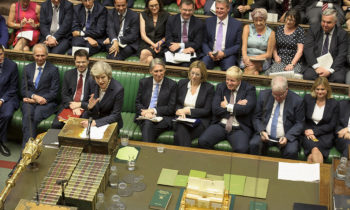 Members of the British parliament will be offered a chance to vote on remaining in the European Economic Area (EEA) after leaving the European Union, following a surprise vote in the House of Lords late on Tuesday (8 May).
Members of the British parliament will be offered a chance to vote on remaining in the European Economic Area (EEA) after leaving the European Union, following a surprise vote in the House of Lords late on Tuesday (8 May).
Despite neither the UK government nor the opposition Labour party leadership approving it, an amendment to the EU withdrawal bill obliging the UK to stay in the European Economic Area after it leaves the EU in 2019 was backed by a majority of 245 Lords against 218.
The vote result came as a surprise, because Labour had urged its peers to abstain in the vote. But 83 Labour peers revolted against Labour leader Jeremy Corbyn’s strategy and secured the majority by voting for the amendment.
As all amendments that are passed by the Lords must automatically be considered and voted on by MPs, the Commons will now need to vote on it too, which could happens as soon as next week.
The Norway model
The EEA is also known as the ‘Norway model’, because Norway is the most important of the three non-EU countries currently using the model for their relations with the European Union.
Legally EEA members are all the EU countries plus Iceland, Liechtenstein and Norway.
Under the model Norway has agreed to accept all EU legislation regarding the single market, and to accept all future legislation that the EU might adopt for the single market in return for free access to the European single market.
The amendment in the House of Lords to stay in the EEA was tabled by Labour Lord Alli, who asked fellow Lords to “support it and ensure that common sense prevails over political dogma”.
Eurosceptics argue that it would leave Britain as “a vassal state” to Brussels.
Stephen Kinnock, a Labour MP and a member of the Select Committee on Exiting the European Union supported in a comment in the Guardian the Norway model, saying that staying in the European Economic Area “would not transgress the prime minister’s red lines on the single market or on ECJ jurisdiction”.
“By committing to an EEA-based Brexit the government would be providing business, consumers and our entire country with the certainty and stability that is so desperately needed,” Kinnock added.
Under EEA has Norway effectively renounced the right to adopt national legislation that may be in violation of the single market’s legislation.
In return, Norwegian businesses and citizens get free access to the European single market.
Norwegian companies are able to compete for contracts on equal terms with EU companies and Norwegians can travel to and work in other EEA member states, while citizens of the EEA can travel to and work in Norway.
The EEA agreement does not come however free of charge. In the 2014-2021 agreement period, Norway will pay a total of almost €2.8bn.
A separate Surveillance Authority and Court of Justice ensures that obligations under the EEA agreement are fulfilled.
Stronger EEA
Theoretically, Norway can say “no” to new legislation if Norway feels it conflicts with its national interests or is irrelevant to the EEA. But until now, this has not happened.
There has also been surprisingly little debate in Norway about the agreement.
The reason is that it forms part of Norway’s national compromise on its relationship with the EU.
A December opinion poll from Nationen and Klassekampen newspapers showed that a majority of 52 percent of Norwegians would vote yes to the EEA if a referendum was held tomorrow. While a larger majority of 66 percent would vote no to EU membership.
According to the Norwegian government would the EEA membership expire automatically when the United Kingdom leaves the EU.
The procedures are governed by Article 127 of the EEA Agreement but the article does not contain specific provisions for the negotiation of a withdrawal agreement, as provided for in Article 50 of the Treaty on European Union.
The article states that at least twelve months’ notice must be given in writing for a country to leave the EEA, but so far has the UK not asked to withdraw, despite there being currently less than a year to when Britain leaves the EU.
